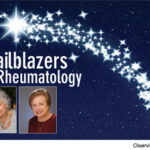We were sad to learn that Rodanthi C. Kitridou, MD, MACR, passed away July 6, 2023, after a long illness. Dr. Kitridou was the longtime director of clinical rheumatology at at LAC/USC Medical Center in Los Angeles.


Staff |
We were sad to learn that Rodanthi C. Kitridou, MD, MACR, passed away July 6, 2023, after a long illness. Dr. Kitridou was the longtime director of clinical rheumatology at at LAC/USC Medical Center in Los Angeles.
Staff |
A grant from the Rheumatology Research Foundation has set two physicians on a course to examine how high-density lipoprotein (HDL) cholesterol is different in rheumatoid arthritis patients
Staff |
Since the beginning of their medical careers, Rodanthi C. Kitridou, MD, and Bevra H. Hahn, MD, have seen a huge shift in the demographics of the field.
Staff |
When the ACR REF recently sent out a call for volunteers for the newly created From the Field speakers’ bureau, Alan W. Friedman, MD, responded right away. “It’s exactly what I’ve been doing all along,” he says. “I want to bring my enthusiasm for the cause to other people.”
A study recently submitted for publication has demonstrated that manipulating T-cell receptor complex–mediated signaling can prevent the development of autoimmune arthritis in mice and may lead to new human therapies without the drawbacks associated with existing treatments.
More than 50 rheumatoid arthritis (RA) investigators from across the U.S. recently met in Ft. Worth, Texas, to share information, present data and results from their innovative RA research projects, and brainstorm ways to work more closely together to find a cure for the disease.
Stanley B. Cohen, MD and E. William St.Clair, MD |
The REF’s campaign to support RA research nears its initial funding target
E. William St.Clair, MD |
Annual giving is a fundraising component of the ACR Research and Education Foundation’s (REF’s) comprehensive development plan—the other main sources being the Industry Roundtable and planned giving, otherwise known as The Legacy Society. What has always struck me about annual giving is the munificence of our donors. When it comes to annual giving, most donors are ACR members whose spirit of generosity makes it possible for the REF to fulfill its mission of advancing research and training to improve the health of people with rheumatic diseases.
A study recently published in Arthritis Care & Research (AC&R) reveals a novel approach for the study of preclinical rheumatoid arthritis (RA). The investigators conducting the study sought to determine if these RA-related biomarkers could also be found in healthy subjects in order to investigate relationships between genetic and environmental factors and the presence of these biomarkers. Their goal is to study how these biomarkers evolve.
Robert McLean, DSc, MPH, is an assistant research scientist at the Hebrew SeniorLife Institute for Aging Research in Boston, and his primary research interests lie in the epidemiology of osteoporosis and related fractures. After working in epidemiology for over 10 years, Dr. McLean recently established himself as an independent investigator without significant prior research experience, thanks to the help of an REF research award designed specifically for early career investigators.